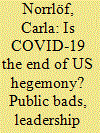| Srl | Item |
| 1 |
ID:
177878


|
|
|
|
|
| Summary/Abstract |
The return of great power rivalry has been the defining feature of the 21st century. Since the beginning of the new millennium, China and Russia have openly defied the United States and upset the stability of the liberal international order. Both China and Russia share physical and material attributes possessed by the United States that are traditionally required for great power status: land mass, a sea portal, a large population, and technology to field and develop a competitive military capability. Most scholars and policymakers agree that China presents the largest challenge to US interests and the US-led liberal international order. Economic and military growth in China has been astounding, surpassing Russian expansion. China’s outward extension is not primarily resource-based as is Russia’s but multidimensional, posing a structural challenge to US military and economic dominance.
|
|
|
|
|
|
|
|
|
|
|
|
|
|
|
|
| 2 |
ID:
179095


|
|
|
|
|
| Summary/Abstract |
Covid-19 is the latest blow to the ailing liberal international order, which has faced a series of challenges in the postwar era. This article traces the global spread of the virus scaled to population and case fatality rates of different countries. Using inferential statistics, I find that liberal democracies have higher case fatality rates than other regime types and offer some plausible explanations for why. Systemically, I show how the spread of the virus complicates the implementation of policies consistent with liberal international order, potentially destroying the order in which liberal democracies participate. Given the paucity of the data as well as cross-country reporting differences in a still evolving crisis, these findings provide a first social scientific cut over the first half year of the pandemic rather than a final assessment of its consequences.
|
|
|
|
|
|
|
|
|
|
|
|
|
|
|
|
| 3 |
ID:
174636


|
|
|
|
|
| Summary/Abstract |
COVID-19 is the most invasive global crisis in the postwar era, jeopardizing all dimensions of human activity. By theorizing COVID-19 as a public bad, I shed light on one of the great debates of the twentieth and twenty-first centuries regarding the relationship between the United States and liberal international order (LIO). Conceptualizing the pandemic as a public bad, I analyze its consequences for US hegemony. Unlike other international public bads and many of the most important public goods that make up the LIO, the COVID-19 public bad not only has some degree of rivalry but can be made partially excludable, transforming it into more of a club good. Domestically, I demonstrate how the failure to effectively manage the COVID-19 public bad has compromised America's ability to secure the health of its citizens and the domestic economy, the very foundations for its international leadership. These failures jeopardize US provision of other global public goods. Internationally, I show how the US has already used the crisis strategically to reinforce its opposition to free international movement while abandoning the primary international institution tasked with fighting the public bad, the World Health Organization (WHO). While the only area where the United States has exercised leadership is in the monetary sphere, I argue this feat is more consequential for maintaining hegemony. However, even monetary hegemony could be at risk if the pandemic continues to be mismanaged.
|
|
|
|
|
|
|
|
|
|
|
|
|
|
|
|